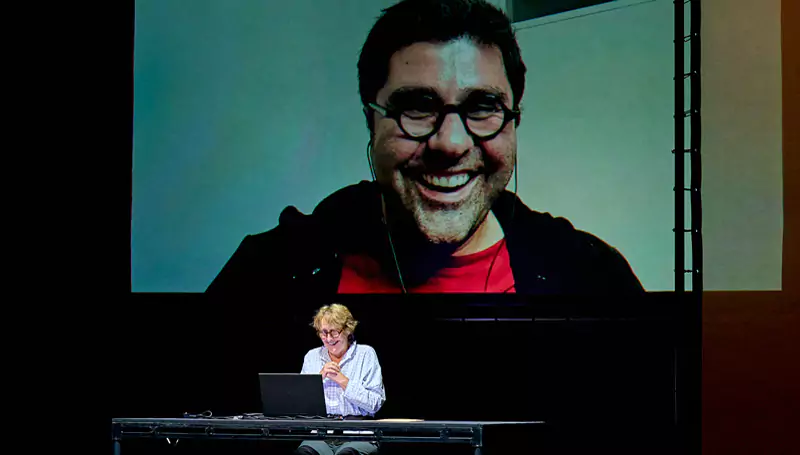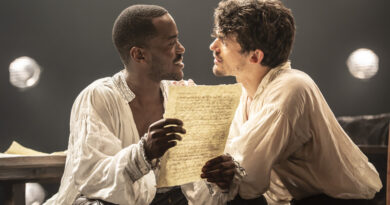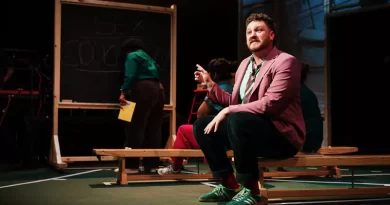“ECHO” (Every Cold-Hearted Oxygen) at Royal Court
Jeremy Malies in West London
21 July 2024
“We tell ourselves stories in order to live,” said Joan Didion. But Didion, famous for her windowpane prose style, edited herself with rigour. On this showing, it’s a lesson that Iranian playwright Nassim Soleimanpour could learn.
ECHO is an unrehearsed cold-read project where on successive nights a different acclaimed actor performs the text with no prior knowledge of it. Fiona Shaw had appeared earlier in the run while heavyweights like Toby Jones and Kathryn Hunter will follow. Jeremy O. Harris (presumably in London for his Slave Play) was the performer the day after press night.
The critics got the incomparable Adrian Lester who (for me at least) failed to make this cliché-ridden script fly despite using all of his prodigious technical armoury. Soleimanpour, who has emigrated from his native Iran, was on a live video link throughout. We saw him in his Berlin flat where his wife was cooking dinner, a dog was asking to be walked, and neighbours clustered near the doorstep to greet Soleimanpour as he went onto the street in a sequence whose truly unscripted nature hit the right chord with me.
The opening had a pre-recorded male voice ask Lester simple questions about set-up and his present mood while there were clunky attempts at humour involving a stage manager who was positioning equipment.
Once we got under way there was an investigation of the nature of memory, how family bonds work, and how émigrés view their homeland and are viewed by those who stay behind. Massive themes such as the Iran–Iraq war (1980–1988 with half a million deaths) were reviewed in a crude manner often with reflections on the playwright’s dissident novelist father. Dissidence was treated in a particularly tricksy sequence where we saw Soleimanpour being interrogated by an immigration officer who smacked of Kafka’s The Trial and Pinter’s One for the Road.
But at least those authors were overt in what they were doing; Soleimanpour shoehorned his version into a format where we never knew quite where we were. I didn’t understand the transition from documentary-style treatment of Soleimanpour and Lester trading pleasantries to the structure in which the sinister officer became part of the plot.
I was similarly underwhelmed elsewhere, and it was the succession of platitudes that I found wearing. At one point these became so bad that I thought the script was poking fun at commonplace expressions used by other playwrights but, no, it’s Soleimanpour’s tone. “We are whispers from the past fading into the future” was repeated many times as an urgent sonorous maxim. This was the pick of a modest collection, perhaps the worst being: “Life is a play in which we only get to appear once.”
Director Omar Elerian (previous work has included his adaptation of Ionesco’s The Chairs) might have reined some of this in. There were some pluses; most notably video design by Derek Richards which included panoramas of Tehran and snowscapes of Iranian countryside with drone footage. By now, the scope had broadened – we may have been in Soleimanpour’s mind – and characters included the author’s hiking buddies who featured the real-life grandson of either Ibsen or Strindberg. (I was past caring at this stage.)
There were oblique allusions to recent plays such as Constellations with its multiple universes and what I took as specifics about A Mirror at the Almeida when we were told that in certain societies simply attending a theatre is an act of defiance. I thought of this magazine’s once prolific Tehran-based correspondent who has gone to ground under the current regime. Iranian theatre enthusiasts deserve more than limp gags about Persian carpets. The themes are enormous and require more adept and serious handling than what is on show here. Just once I even thought that Lester was embarrassed. At times he read from a computer screen, elsewhere he had sophisticated autocue, and finally (acknowledged openly) a feed from an earpiece. At one point the ever affable Lester melded with some Vivaldi.
Audience response was ecstatic and yet I couldn’t but think of “The Emperor’s New Clothes”. There were even references in the script to the fact that this was press night which contributed to a generally self-conscious vibe in the stalls. Had I not been reviewing with a comp ticket and required to write something, my seat would have tipped and I would have been on my toes. “A play is a door to another universe” was yet another of the trite observations. Well not this play for this viewer I’m afraid. The script might reference the Hubble Space Telescope but for me ECHO remained earthbound.
[Photo shows Fiona Shaw on an earlier night]









